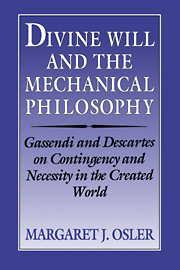 Divine Will and the Mechanical Philosophy
Divine Will and the Mechanical Philosophy Book contents
- Frontmatter
- Contents
- Acknowledgments
- Introduction
- Part I Theology and the philosophy of nature
- Part II The mechanical philosophy and the formation of scientific styles
- 7 Introduction: Theories of matter and their epistemological roots
- 8 Gassendi's atomism: An empirical theory of matter
- 9 Mathematizing nature: Descartes' geometrical theory of matter
- 10 Conclusion: Theology transformed – the emergence of styles of science
- Bibliography
- Index
7 - Introduction: Theories of matter and their epistemological roots
Published online by Cambridge University Press: 11 September 2009
- Frontmatter
- Contents
- Acknowledgments
- Introduction
- Part I Theology and the philosophy of nature
- Part II The mechanical philosophy and the formation of scientific styles
- 7 Introduction: Theories of matter and their epistemological roots
- 8 Gassendi's atomism: An empirical theory of matter
- 9 Mathematizing nature: Descartes' geometrical theory of matter
- 10 Conclusion: Theology transformed – the emergence of styles of science
- Bibliography
- Index
Summary
In Part I, I showed how the medieval discourse about divine power and its relationship to the created world was refracted in the prism of seventeenth-century natural philosophy, emerging as the two very different approaches to the epistemological status of knowledge about the natural world adopted by Gassendi and Descartes. In Part II, I turn to the mechanical philosophy itself, namely, the view that all natural phenomena can be explained solely in terms of matter and motion. Here I explore how the theories of matter these mechanical philosophers adopted reflected their respective epistemological inclinations and thereby engendered two distinct styles of science.
In its role as conceptual framework, the mechanical philosophy determined the ultimate terms of explanation in which the physical world was to be understood and the methods by which knowledge of that world could be acquired. At the most abstract level, the mechanical philosophy replaced both the Aristotelian metaphysics of matter, form, and privation and the Neoplatonically inspired animistic philosophies of the Renaissance with a new metaphysics, which populated the natural world with only one kind of entity, matter. The motions, positions, and collisions of particles of matter were thought to be sufficient to explain everything in the physical world. In this mechanistic framework, matter was the only real existent, and causality was reinterpreted in terms of the impact of material particles. Action at a distance was deemed impossible.
The concept of matter adopted by the mechanical philosophers differed in important ways from the older theories of matter.
- Type
- Chapter
- Information
- Divine Will and the Mechanical PhilosophyGassendi and Descartes on Contingency and Necessity in the Created World, pp. 171 - 179Publisher: Cambridge University PressPrint publication year: 1994


